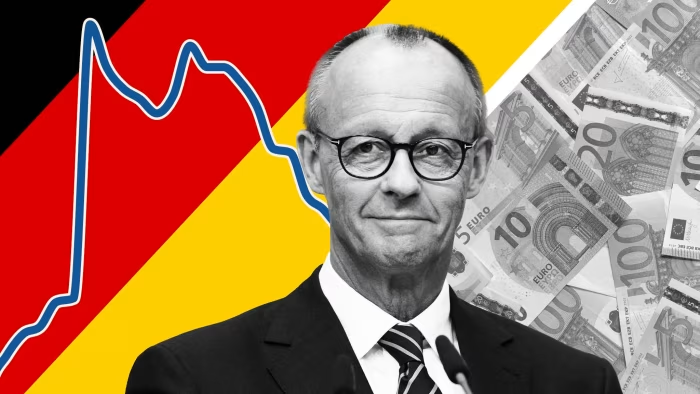Germany’s prospective coalition government has agreed to establish a €500 billion infrastructure fund and revamp borrowing rules to modernize its military and stimulate economic growth.
This move signals a dramatic departure from previous fiscal policies as leaders push to strengthen Europe’s largest economy and bolster its defense capabilities.
Friedrich Merz’s conservative CDU/CSU alliance and the Social Democrats (SPD) have been in coalition negotiations following last month’s national election.
Their newly proposed measures will be presented to the German parliament next week, with the aim of fast-tracking reforms before the new parliament convenes.

Germany’s defense spending has come under renewed scrutiny, especially following U.S. President Donald Trump’s recent decision to freeze military aid to Ukraine after a tense exchange with Ukrainian President Volodymyr Zelensky.
READ ALSO: Trump Threatens to Cut Federal Funding for Schools Allowing ‘Illegal Protests’
The situation has underscored the urgency for Europe to enhance its own defense capabilities rather than relying solely on American support.
Economists and investors have long advocated for reforming Germany’s constitutionally enshrined “debt brake” to enable greater public investment. The German economy has been in a slump for the past two years, and experts argue that lifting borrowing restrictions could provide the necessary boost to reverse the downturn.

“In view of the threats to our freedom and peace on our continent, whatever it takes must now also apply to our defense,” said Friedrich Merz, widely expected to become Germany’s next chancellor. “We count on the United States to uphold our alliance commitments, but we must also expand our own national and collective defense resources.”
The CDU/CSU and SPD plan to submit a motion to the Bundestag to amend the constitution, allowing defense spending above 1% of economic output to be exempt from the debt brake.
Such a change requires a two-thirds majority, prompting urgency in passing the reform before the new parliament is seated, where far-right and far-left parties are expected to hold a blocking minority.

Sebastian Dullien of the IMK institute called the proposed measures a “real game-changer.” He noted that if successful, the stagnation of the German economy could end swiftly, not only due to long-overdue investments but also because of the psychological shift it would create. “Germany will once again be economically and militarily capable of taking action,” he added.
The announcement had an immediate impact on financial markets, with shares of German defense firms Rheinmetall, Hensoldt, and Renk climbing between 1.5% and 5.2% in late trading.
Looking ahead, Merz is scheduled to meet with outgoing Chancellor Olaf Scholz on Wednesday to discuss additional aid for Ukraine.

Meanwhile, SPD leader Lars Klingbeil emphasized the broader significance of the infrastructure fund: “Our country has been deteriorating, and it was crucial for us to invest massively to restore its functionality. A future government must put an end to this decline.”
Discover more from Scoop Hub
Subscribe to get the latest posts sent to your email.

